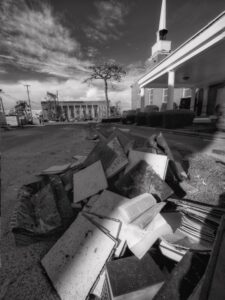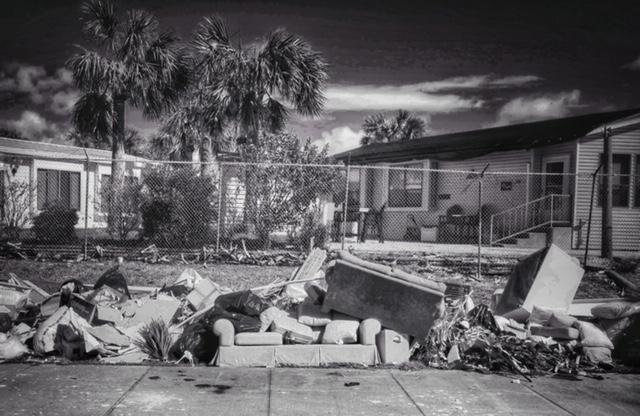By Mark K. Dolan
Associate Professor of Journalism
It starts in south Alabama.
Acres of snapped trees, bark at the broken spots like peeled skin, pine sap in the air. Power lines knotting sidewalks, church steeples tossed in parking lots.
Farther south, near the Florida line, torn-away roofs and shattered windshields, homes leveled. Towards Panama City, more heartache – block after exploded-looking block, homes and buildings crouching in defeat, everything nightmarishly askew.

With a group of student reporters from the University of Mississippi, I stand at a marina jammed with half-submerged sailboats, trying to feel the Florida where I was raised. One student, Madison, who went to high school in Jacksonville, says she can’t feel anything either.
Ole Miss graduate Jeff Rish, 63, lives on a cul-de-sac in nearby Lynn Haven where the northern eyewall of Michael passed, taking down every tree in sight, though miraculously none fell on his house. He’s spent each day since in the hot sun with a chainsaw, trying to clear his yard.
It’s not about my feelings, he says, but about what has to be done next. Yet there in his living room, Rish breaks down on camera when students ask him if he has anything else to add.
Deeper emotions erode routine hugs and heroic out-of-state Humvees, every kind of relief effort. A young woman with short, blond hair and expensive looking sunglasses stands in front of an empty parking lot at a strip mall looking at her office, which appears dynamited.
She takes a photo in the late afternoon sun with her cell phone and walks away crying. “I worked here,” she says, jaw quivering.

As evening curfew approaches, a line of police cars rushes along 15th Street, their lights making shadows. Police from Miami, Pensacola and other Florida cities join forces with local cops, though Panama City feels, well, rudderless. Signs warn looters they’ll be shot. Nicer signs just say the owner plans to return.
People wear respirators to filter out Fiberglass. The city smells like mildew, and sometimes you catch a whiff of garbage that reminds you of Michael’s victims—a population living with no power, water, no roof, having to endure day after day of a thing with no end in sight. One man told me he could watch the sunrise through his front window now because the trees are gone.

We slept on couches at the Evergreen Presbyterian Church in Dothan, Alabama—a couple of hours away—and took showers at Flying J truck stop.
Pastor Joseph Johnson grew up in Florida, driving a bread truck along Panama City Beach in his teens. He’s now working 70-hour weeks, helping people cope, and like so many others, doing what has to be done next. When he slows down, you can also hear the emotion in his voice—the realization that Florida, a part of himself, will never be the same.
I look in vain on this trip for what people call Old Florida, the mom-and-pop motels with neon signs and turtle-shaped soaps, my father’s hands on the steering wheel of a green International Scout, Dairy Queens and roadside mermaid attractions, my footprints wet from swimming pools on sidewalks, sand dancing on car floor mats.
Maybe journalistic metaphors unlock the past, I tell myself – though calling the hurricane’s destruction, a war zone, for example, doesn’t get you any closer to what it felt like growing up in Florida and seeing the Panhandle now, all scammers and desperation, where a young man will look an old woman in the eye and charge her $1,000 to haul a pine tree to the curb.
Sure, there’s an outpouring of hugs and generosity, too, and that helps you along the path.

Catch just the right glimpse of the beach and the past comes rushing back. I see my father using those floor mats to help get the rear tires out of the sand one time at low tide. Or another day when I read a C.S. Lewis novel in an abandoned orange lifeguard stand as the tide came in and had to wade back to shore, carrying the book above my head to keep it from the waves.
At Sunday service before heading home, Pastor Johnson preached about Job and the vastness of the universe, and how in all that vastness, God knew my name. I like to think God can see me back then, even if my eyes fail, in all this vastness, holding a transistor radio on Panama City Beach, the bright blue Gulf in the background, the gentle waves, my tanned shoulders.

